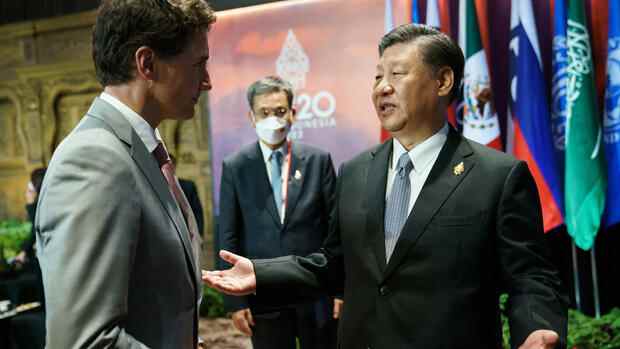Bangkok China’s head of state and party leader Xi Jinping has spoken out in favor of openness in the Asia-Pacific economies. Speaking at the Asia-Pacific Summit (APEC) in Bangkok on Friday, Xi called for strengthening macroeconomic coordination. He lamented that protectionism is on the rise, global supply chains are under pressure, and issues such as inflation and energy security are challenging.
Xi urged neighboring countries to adopt a cooperative security system and warned against “interference in internal affairs.” The “legitimate security concerns of each individual country” should also be taken seriously. The sovereignty and territorial integrity of the countries must be respected, the President demanded, without addressing China’s disputed claims to islands in the East and South China Seas or the island democratic republic of Taiwan.
The day before the start of the economic community summit, Xi had warned of an escalation. The Asia-Pacific region must not become the scene of great power struggles. “Any attempt to politicize and weaponize economic and trade relations should be rejected by all,” he said.
Xi’s remarks were obviously aimed at the United States, which aims to build an economic counterweight to the People’s Republic in China’s neighboring countries. China’s head of state called for resistance. The region must collectively “reject the Cold War mentality and the bloc confrontation,” he demanded, without naming the United States directly.
Top jobs of the day
Find the best jobs now and
be notified by email.
Xi was originally scheduled to present his perspective on the great power conflict between the US and China in a keynote address to business leaders in Bangkok on Thursday. At short notice, however, he canceled the appearance, which was supposed to take place after the G20 summit. However, the government in Beijing distributed the text of the speech in writing.
Scandal with Canada’s Prime Minister Justin Trudeau
Instead, Xi used his trip to the Thai metropolis on Thursday for a series of bilateral meetings, including with Japan’s Prime Minister Fumio Kishida.
Unlike a number of other heads of state and government, US President Joe Biden decided not to travel on from the G20 summit in Indonesia to the Apec summit in Thailand. He is represented by Vice President Kamala Harris, who wants to present America’s view of cooperation between the economic regions around the Pacific on Friday. Biden’s cancellation of a personal visit was met with disappointment from the hosts and, according to political observers, allows Xi to take up a particularly large space at the meeting.
Also present in Bangkok is Canada’s Prime Minister Justin Trudeau, who was at the center of a diplomatic spat with Xi Jinping on Wednesday. In front of the television cameras, the otherwise extremely controlled appearance of Xi was visibly angry.
Xi accuses Trudeau of information piercing
He blamed his Canadian counterpart on the sidelines of the G20 summit for leaking content from a meeting between the two politicians to the press. “Everything we discussed leaked to the press, it’s not appropriate,” Xi accused Trudeau through a translator. “And that’s not the way the conversation was conducted,” he added.
Xi was probably referring to media reports that Trudeau allegedly complained of espionage and Chinese election interference at his meeting with the Chinese leader. China’s foreign ministry on Thursday tried to downplay Xi’s unusually undiplomatic response.
A spokesman said it was a normal, short conversation between the two politicians. “I don’t think this should be interpreted as Xi criticizing or blaming anyone.”
The incident provided a rare public glimpse into China’s tense relationship with the West. At a press conference in Bangkok, US Secretary of State Antony Blinken reiterated that the Biden government intends to promote “violent competition” with China – but is working to ensure that this does not degenerate into a conflict. At the heart of Biden’s economic Asia strategy is the “Indo-Pacific Economic Framework” initiative, which aims, among other things, to strengthen supply chains with China’s neighboring countries.
The US Secretary of State wants to promote “tough competition” with China.
(Photo: dpa)
In the course of the tensions with China, the USA recently imposed export restrictions on the Chinese chip industry with the aim of denying the People’s Republic access to certain semiconductors.
Xi warned in his written speech on Thursday: “Any attempt to disrupt or even smash the industrial and supply chains that have been built up over many years will lead economic cooperation to a dead end.”
Instead, Xi tried to promote his country as an economic role model for the region. “The modernization of China, a country of over 1.4 billion people, will be of epochal importance for human history,” he said in his speech.
In the run-up to the summit, there were protests against the Chinese president.
(Photo: Reuters)
“We will continue to focus on people and increase the standard of living.” He probably couldn’t convince everyone in Bangkok. On the fringes of the summit, there were protests by Thai democracy activists in the metropolis, which were also directed against Xi Jinping personally. A poster showed his photo, captioned “Dictator out.”
More: ‘An Unnecessary Mistake’: US Leaving Stage to Xi Jinping
